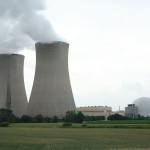Nuclear energy to be phased out by Germany after Japan disaster
Nuclear energy has been a favorite among developed nations in providing power to sustain economic growth. But Germany has for many years planned a steady transition to get rid of their nuclear energy program within 25 years.
The Fukushima nuclear power plant disaster in Japan has hastened the European country's decision to look for other sources of power. The German government is spending billions of dollars to develop renewable energy projects to replace the 25 percent of electricity being currently supplied by nuclear power plants.
In light of what German Chancellor Angela Merkel dubbed as a "catastrophe of apocalyptic dimensions" in Japan, the Germans have shut down seven of 17 nuclear reactors for safety checks. The next three months will give the country a good measure of how Germany can cope with less nuclear energy in the coming years.
The German plan to wean off from nuclear power may be applicable to the United States too since the two countries have similar scale and set-ups with their nuclear energy program.
"If we had the winds of Texas or the sun of California, the task here would be even easier," said Felix Matthes of the Institute for Applied Ecology in Germany. "Given the great potential in the U.S., it would be feasible there in the long run too, even though it would necessitate huge infrastructure investment."
Radiation from the Chernobyl nuclear explosion in 1986 reached Germany and created disdain against the program. A previous administration drafted a full phase-out ten years ago.
Nuclear reactors in Germany were supposed to be shut down for good by 2021, but Berlin decided last year to extend the plants' operations by roughly 12 years. But with the events in Japan, it looks like Germany will further hasten the move away from nuclear energy.
